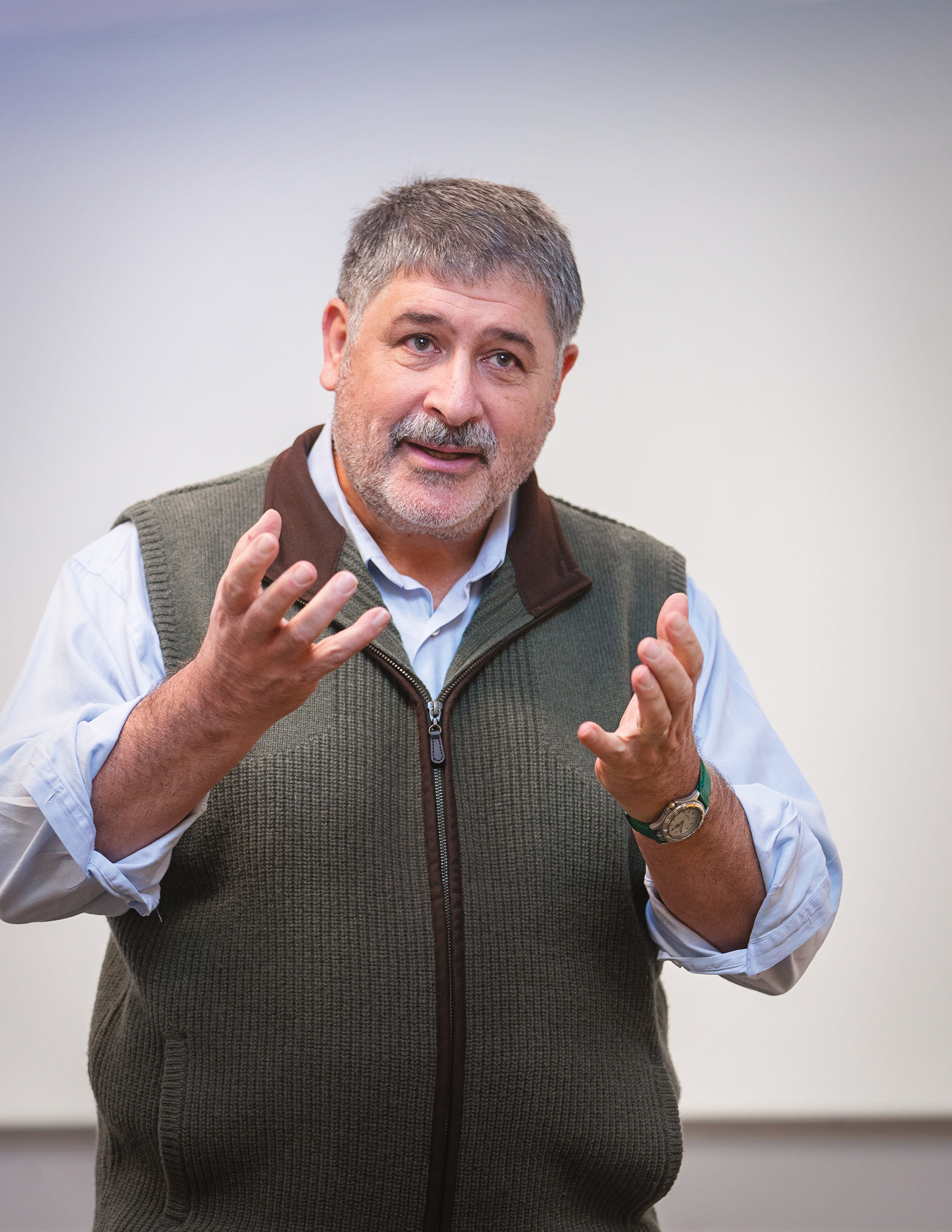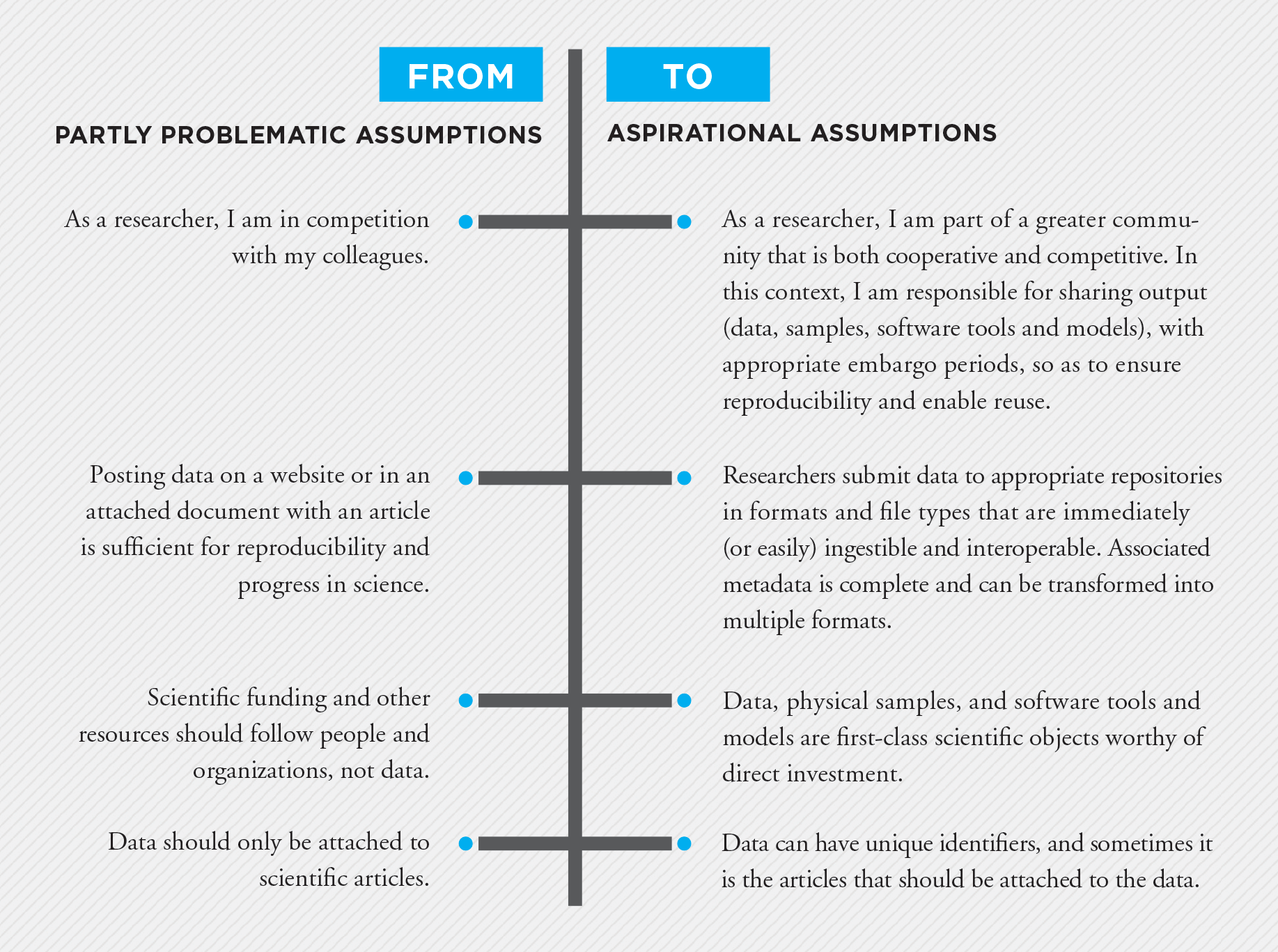By Joel Cutcher-Gershenfeld, Professor

The geosciences are at the heart of vast challenges facing the Earth and human civilization that involve global climate change, natural resources and natural disasters. Advances in the geosciences depend, in part, on increased collaboration and sharing of data, physical samples, and software tools and models. Such sharing runs counter, however, to long-standing assumptions that are deeply embedded in the culture of science — assumptions that position science as a competitive enterprise centered on advancing the narrow self-interests of key stakeholders.
This article reports on an innovation developed as part of a series of multistakeholder meetings focused on fostering more open sharing of data and increased collaboration in the geosciences, commensurate with the challenges facing the planet. This experimental process, which we termed “assumptions wrangling,” is important for members of the Heller community for at least two reasons: First, the effort itself will be of interest to those concerned with climate change and the culture of science. Second, the process of engaging with deeply embedded cultural assumptions is applicable in many other contexts.
In September 2018, an international assembly of scholarly publishers, research data facilities, public and private funders, professional societies and non-governmental organizations engaged in this process of assumptions wrangling, borrowing terminology from what is called “data wrangling” in science. We motivated the exercise with the observation that “everyone complains about the culture — here is a way to do something about it.”
These stakeholders who gathered have been meeting on an annual basis over the past four years, with working groups focused intensively in the past year on a very high-leverage part of the geoscience ecosystem: a commitment 1) by publishers to insist that scholarly articles be accompanied by the underlying data in order to be published; 2) by authors to make these data openly and persistently accessible in public data repositories; and 3) by data repositories to receive the data and curate them for reuse. The umbrella over the initiative is for the data to be open and fair (Findable, Accessible, Interoperable and Reusable). With these commitments in place, the institutional leaders sought to advance the necessary culture changes.
As the facilitator for the workshop, I developed the assumptions wrangling approach in collaboration with the project steering committee, which included Brooks Hanson of the American Geophysical Union (AGU); Kerstin Lehnert from Columbia University’s Interdisciplinary Earth Data Alliance (IEDA); Brian Nosek from the Center for Open Science (COS); Mark Parsons of the Tetherless World Constellation (TWC); Erin Robinson of Earth Science Information Partners (ESIP); Shelley Stall, also from agu; Lesley Wyborn from the Australian National University (ANU); and Lynn Yarney from the U.S. Research Data Alliance. Funding for this workshop and various working groups was provided by the Laura and John Arnold Foundation.
Assumptions wrangling builds on Douglas McGregor’s identification of the importance of “tuning our ears” to underlying assumptions about human behavior, which he described in his 1960 book “The Human Side of Enterprise.” Ed Schein advanced this approach in his 1990 book “Organizational Culture and Leadership,” in which he urged us to look beyond the visible artifacts of culture and the stated policies and procedures in order to get at the deep, underlying (often unstated) assumptions. Along with my co-authors on the 2014 book “Inside the Ford-UAW Transformation,” we identified 56 pivotal events over three decades in which deeply embedded operating assumptions were “on the table” as part of a cultural transformation. This approach also builds on the work of the Stakeholder Alignment Collaborative, which I co-lead, and our forthcoming book “Data Work,” which is centered on deep assumptions in the culture of science.

The Asssumptions Wrangling Process We Crafted Involves Four Steps
- Step 1: From/To assumptions
- Step 2: Driving/restraining forces
- Step 3: Indicators
- Step 4: Personal and Ecosystem Implications
The process begins with identifying current, partly problematic embedded assumptions and alternative aspirational assumptions — what we termed the “From/To” stage. We call these “operating assumptions,” since they are deeply embedded in the operating practices of the science enterprise.
Note that the “partly problematic” assumptions are also partly functional. They have various logics supporting them, so shifting these assumptions is not just a matter of calling them out. In this workshop, small groups brainstormed lists of restraining and driving forces associated with selected From/To pairs, recognizing that there are restraining forces that serve the interests of some or all stakeholders. In this case, restraining forces include incentives and rewards associated with career advancement (emphasizing individual rather than collective efforts), lack of knowledge and skill in the associated data work, funding models that don’t anticipate long-term storage and reuse of data, among many other factors. Driving forces include the coordinated efforts of the key stakeholders (such as the commitment statement), changes in incentives (data sharing will be part of the selection criteria for fellows in the agu), changes in policies (funding agencies enforcing required datamanagement plans in proposals) and other developments.
The third step in assumptions wrangling involves identifying specific indicators that would represent evidence of change in the underlying assumptions. There are many in the geosciences, including demonstrated compliance with data management plans listed in research proposals; increased ingestion of data and other research objects in data facilities; documented reuse of data from data facilities; inclusion of evidence of data reuse in tenure and promotion cases; and other behavioral indicators. However, the most important indicators are advances in the earth, space and environmental sciences that would not have been possible without the sharing and reuse of data. Tracking these impacts is what will be most important in a long-term shift in the underlying assumptions.
Completing the workshop process involved asking over 60 institutional leaders to indicate specific behavioral changes they would advance in their work over the next 18 months that are reflective of the “To” assumptions, as well as larger changes in the ecosystem that they see as essential. In this case, the commitments will be evident in editorials in leading scientific journals; workshops at professional meetings; new prizes and honors supportive of data sharing; collected success stories; policy changes to require data submissions with articles; tools to help researchers find relevant repositories; and methods to attach unique digital identifiers to data, samples and software. We developed the assumptions wrangling approach with the expectation that these action commitments would be more far-reaching than if we just asked people to identify next steps without taking a deep dive on assumptions, and this was indeed the case.
Ultimately, the process of shifting deeply embedded operating assumptions will be an iterative one rather than a one-time event. In this case, there are concrete plans to track the various indicators identified as a “check and adjust” on the action commitments. Heller alumni who hope to focus and accelerate culture change efforts are welcome to continue the assumptions wrangling experiment in other settings (and let us know about your experiences). Progress in the case of the geosciences is important to us all in that planet Earth is at stake, and advances in the earth, space and ecological sciences depend on culture changes that foster increased cooperation and data sharing. And adaptation to other settings is also important, since there are so many social impact domains relevant to the Heller community where culture change is needed.
Selected signatories of the current commitment statement on publishing data in the earth and space sciences
- Alfred Wegener Institute, Helmholtz Center for Polar and Marine Research (AWI)
- American Geophysical Union (AGU)
- Biological and Chemical Oceanography Data Management Office
- California Digital Library (CDL)
- CLIVAR and Carbon Hydrographic Office (CCHDO)
- Center for Marine Environmental Sciences, University of Bremen (MARUM)
- Copernicus Publications
- DataCite
- DataONE
- Digital Rocks Portal
- DIW Berlin
- Elsevier
- Environmental Data Initiative
- Global Biodiversity Information Facility (GBIF)
- Geological Data Center, Scripps Institution of Oceanography
- GFZ Data Services
- GFZ German Research Centre for Geosciences
- gvSIG Association
- Hypothes.is
- Interdisciplinary Earth Data Alliance
- Mendeley Data
- ORCID
- PAGES (Past Global Changes)
- Paleobiology Database
- PANGAEA.de
- PLOS
- Science and Science Advances
- Ubiquity Press
- U.S. Geological Survey
- WDC Climate, Deutsches Klimarechenzentrum (DKRZ)
- Wiley
